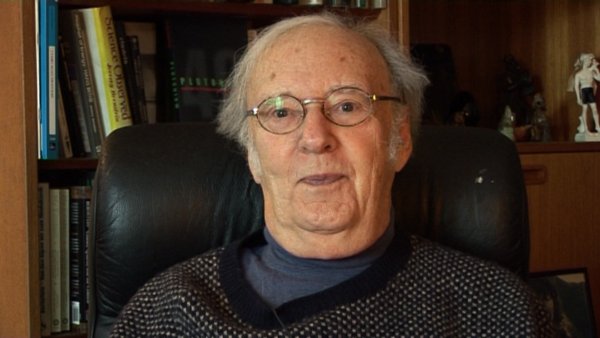NEXT STORY

Freeman Dyson - superb physicist and superb mathematician
RELATED STORIES

NEXT STORY

Freeman Dyson - superb physicist and superb mathematician
RELATED STORIES


|
Views | Duration | |
|---|---|---|---|
| 71. Losing respect for Felix G Rohatyn | 413 | 00:46 | |
| 72. Lewis Thomas | 273 | 00:52 | |
| 73. Jonathan Miller: 'The greatest conversationalist I know' | 473 | 00:29 | |
| 74. Oliver Sacks and the steak knife tracheotomy | 432 | 01:16 | |
| 75. 'Freeman Dyson was a hero of mine' | 823 | 01:52 | |
| 76. Freeman Dyson the genius | 905 | 01:09 | |
| 77. Becoming friends with Freeman Dyson | 822 | 01:44 | |
| 78. Planck time | 1085 | 03:27 | |
| 79. Freeman Dyson - superb physicist and superb mathematician | 810 | 01:13 | |
| 80. The Templeton Prize | 503 | 00:27 |


The puzzle for him is why is everybody else so slow. He... he can't understand that other people are slow. He's very nice about it but just strikes him as curious. Ted Taylor, who as you know is (inaudible) once told me that he thinks that Dyson never has failed to understand anything that he wanted to understand. And he's never forgotten it, it seems all to be there. Recently... I... we exchange emails quite a bit – I gave a lecture on my climbing and stuff in the Himalayas and Freeman introduced me. It was very nice of him to do. And then he said that the last scientific paper he wrote we'd collaborated that... which is true, it's a paper we worked on from General Tomek and so on. Then we all had dinner together, it was a very nice occasion. I think that's the last time I actually saw him, but we communicated a lot and... I wrote a letter about quantum mechanics, which I kind of described in an informal way, what I think the dilemmas are and how various people are dealing with. And at the end I gave what I call a devinette that had to do with the Planck time. The Planck time is a very time... in the very early universe is composed of all the natural constants. If you take the gravitational constant, Planck's constant... the speed of light, the charge on the electron – you can combine these things together and produce a unique time, which is called the Planck time because Planck invented these so called natural units. There's a puzzle, which is that it's not a time. It has the dimensions of a time but it's clearly not a time because it's made out of all these universal constants, which are... they're all constant under the (inaudible) transformation. In relativity, time transforms, if you look at your clock in a moving system it slows down. But these things are all constants, they don't transform. So I posed this as a devinette, the end, and said here's a devinette, here's the Planck time... these constants. So Dyson produced a marvellous little proof that it's a time you can't measure with a clock. Because to measure it would require a clock that's more massive than a black hole and it would just implode. The Planck time cannot be measured. Beautiful... beautiful thing and he had a dozen lines of proof. Wonderful, I couldn't do this if the Gestapo were here and put... put lighted matches under my fingernails. I couldn't do this... I can't... I'm not capable of doing this But I certainly can understand and I certain;y can admire it. Wonderful, just wonderful.
Born in 1929, Jeremy Bernstein is an American physicist, educator and writer known for the clarity of his writing for the lay reader on the major issues of modern physics. After graduating from Harvard University, Bernstein worked at Harvard and at the Institute of Advanced Studies at Princeton. In 1962 he became an Associate Professor of Physics at New York University, and later a Professor of Physics at Stevens Institute of Technology in Hoboken, a position he continues to hold. He was also on the staff of The New Yorker magazine.
Title: Planck time
Listeners: Christopher Sykes
Christopher Sykes is an independent documentary producer who has made a number of films about science and scientists for BBC TV, Channel Four, and PBS.
Tags: Princeton University, Ted Taylor, Freeman Dyson, Max Planck
Duration: 3 minutes, 27 seconds
Date story recorded: 15th June 2011
Date story went live: 28 October 2011